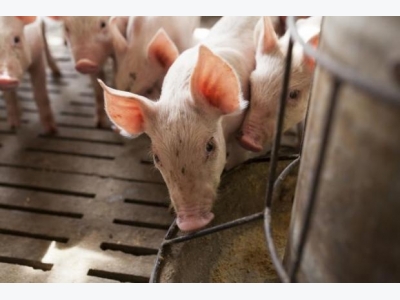Bio-refineries could reduce imports of environmentally harmful soy

Animal feed mixed with imported soy beans is a drain on the environment. A new report suggests that environment-friendly protein can be produced in bio-refineries.
Soy beans from Asia and South America are imported for cheap animal feed, but with serious environmental consequences. Danish farmers could soon have a more sustainable alternative. (Photo: Shutterstock)
Farming in Europe is one of the primary causes of the ongoing deforestation in South America as rainforests are cleared to make way for large soy bean plantations.
Each year, Denmark alone imports 1.5 million ton of soy a year to make animal food. Eighty per cent of this is for pigs.
Soya contains about 40 per cent protein, making it an important part of the animals’ diets.
A new study suggests that clover could be a convenient alternative and reduce Europe’s reliance on cheap, unsustainable soya.
“When cheap soy beans were introduced to the market in the 1970s, we didn’t think much about the environmental costs. So why would we have been developing protein ourselves?” says co-author Uffe Jørgensen, a senior scientist at the Institute of Agroecology at Aarhus University, Denmark.
“But now we have a totally different environmental agenda alongside new technologies that we can use to extract proteins that comes with environmental benefits. And we would just need nine per cent of agricultural land [in the case of Denmark], to produce a significant share of the protein” he says.
Read More: A new GMO technique that organic farmers will love
Good results in pilot project
The report makes the case for establishing a bio-refinery sector in Denmark to produce sustainable biomass for animal feed.
If farms planted perennial crops such as grass and clover, they would produce up to ten million tonnes of additional biomass each year--without compromising food production--according to the new report.
There are also environmental benefits since the extra biomass can be converted to energy and protein in bio-refineries.
“Grass and clover have a naturally high-quality protein content, so it can definitely compete with soya,” says Jørgensen.
Read More: Ancient crops are the future for our dinner plate
High demand could make protein extraction a reality
Both organic and conventional farming relies on imports of cheap soya, so any alternative has to match this cheap price to avoid the costs being passed on to the consumer.
Mette Lübeck studies bio-refinery processes at the Institute of Chemistry and Bioscience – Section for Sustainable Biotechnology, University of Aalborg University, Denmark.
She was not involved in the new research but has also studied protein extraction processes for animal food.
She is optimistic about the costs involved.
“It looks like we’re close to being able to produce economically sustainable protein domestically. It’s not a gold rush, but it’s realistic and the high demand is a good motivating factor,” says Lübeck.
By-products of the production process could also be an important source of cattle feed, energy, and fertiliser.
Translated by Catherine Jex
Related news
 Outstanding farmers launch agri startups
Outstanding farmers launch agri startups Trần Trung Hiếu, a farmer from An Giang Province’s Châu Thành District, not only cares for his orange garden, but does so using an invention he designed
 Why do farmers use fertilizers?
Why do farmers use fertilizers? Soils naturally contain many nutrients like nitrogen, phosphorous, calcium, and potassium. These nutrients allow plants to grow
 How sustainable is organic food?
How sustainable is organic food? Organic food seems like it should be good for the environment. But not all Norwegian researchers agree it is sustainable.